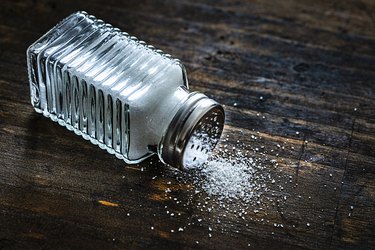
Are your hands swollen? Do they look puffy and feel tight? You may be experiencing hand edema, swelling caused by the retention of fluid in the tissues of your body, and not by an injury.
Read more: Will Drinking Water Help Reduce My Edema?
Video of the Day
Video of the Day
What's Normal, What's Not
"Hand edema is a common complaint," says Tina D. Mahajan, MD, a rheumatology specialist at the Nebraska Medical Center and an assistant professor of medicine at the University of Nebraska College of Medicine in Omaha. "It happens when your blood vessels are relaxed. Fluid can move out of your blood vessels and into your tissues, [and] the fluid will pool where gravity takes it."
She says that edema can develop in your hands at night or during the day if you're standing with your hands hanging down.
"If your hands are swollen in the morning and the swelling goes down once you start moving around, this is probably normal edema … called physiologic edema," she says, adding that you may also have some edema in your feet or ankles.
Normal edema is more common in hot weather or when you've been standing or sitting too long, according to the American Academy of Family Physicians (AAFP). But, if you have edema that makes your skin stretched and shiny, you should let your doctor know. If pushing your finger into the swollen area causes a dimple that lasts for about 15 seconds, your doctor may want to do some tests to find out if your edema is caused by a medical condition, says AAFP.
Other Causes of Edema
"Common conditions that cause edema are congestive heart failure, kidney disease and liver disease," says Dr. Mahajan. "Heart and kidney disease may cause edema that is worse in your feet and ankles and does not clear up quickly when you put your feet up. Fluid retention in the abdomen is called ascites, and may be caused by liver disease."
According to the Mayo Clinic, other causes of edema include:
- Having too much salt in your diet
- Pregnancy
- Medications, including nonsteroidal anti-inflammatory drugs (NSAIDs), high blood pressure medications, some diabetes medications, steroids and estrogen
- A severe lack of protein in your blood
- Weak
veins or a damaged lymphatic system, which returns fluid to your blood vessels
What to Do
If you have edema in your hands, lifting your hands above your head or doing hand/arm movements should reduce your swelling. To reduce leg and ankle edema, put your legs up, and avoid long periods of sitting or standing still. You can also try reducing the amount of salt in your diet, according to the AAFP and Dr. Mahajan.
If your hands are swollen, massaging the swelling toward your heart may help move fluid out of the area. Wearing compression stockings for edema in your legs, or compression sleeves or gloves for edema in your hands, may also help, adds the Mayo Clinic.
It's also important to watch for complications. According to the Mayo Clinic, these may include:
- Swelling that becomes painful
- Swelling of your ankles or feet that makes it hard to walk
- Skin that becomes stretched, shiny and itchy
- Shortness of breath
Treatment for edema depends on the cause. One common treatment, though, is taking a water pill, called a diuretic, adds Mayo Clinic.
Read more: Are Water Pills Healthy?
"If hand or feet edema is getting worse or does not respond to movement and elevation, let your doctor know," says Dr. Mahajan. "Swelling that affects your whole hand is more likely to be edema. Swelling that affects just the joints of your fingers and causes pain may be inflammation, [and] this type of swelling may be a sign of arthritis. Always let your doctor know if you have painful joint swelling."
Is this an emergency? If you are experiencing serious medical symptoms, please see the National Library of Medicine’s list of signs you need emergency medical attention or call 911.